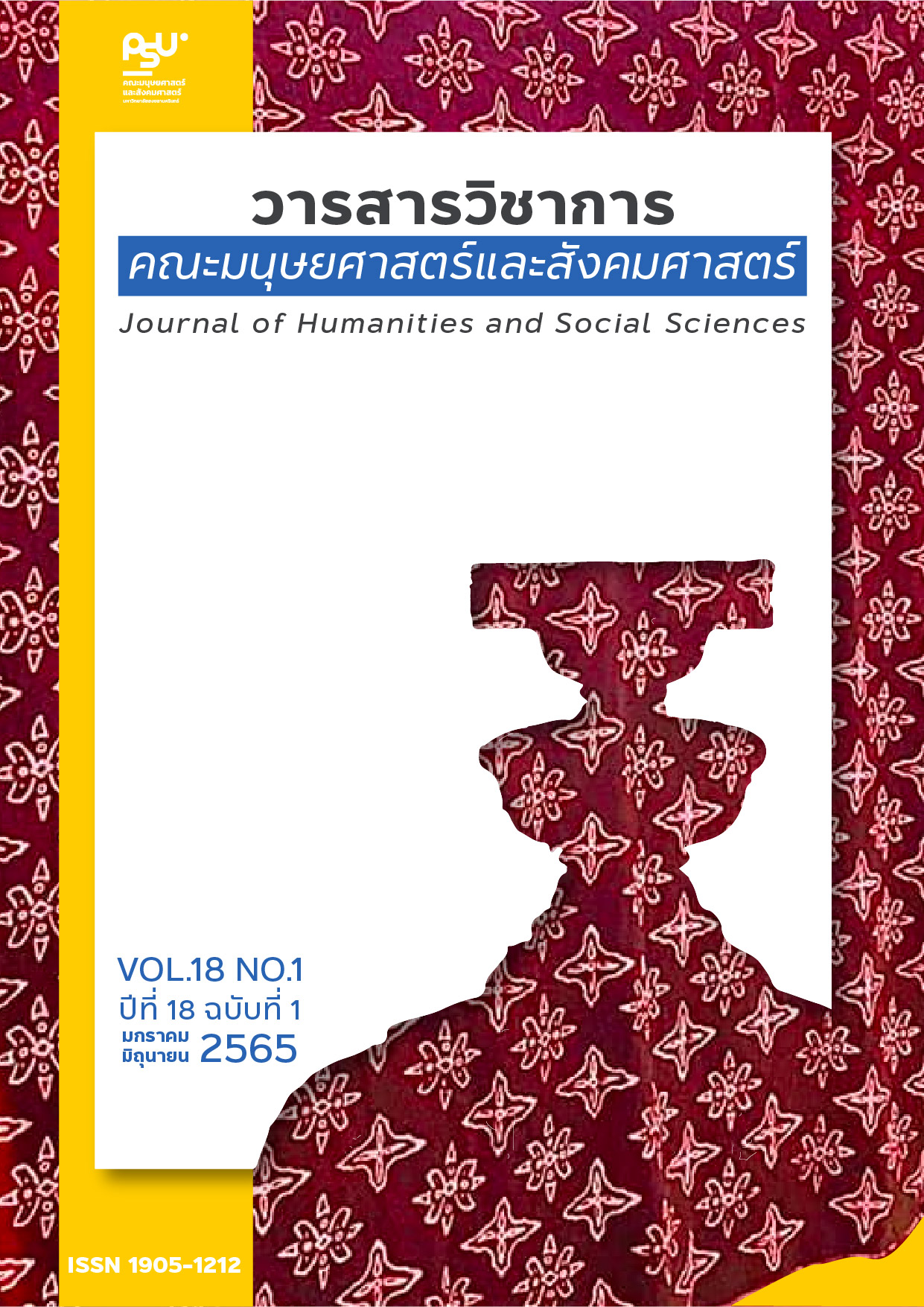Cruise Tourism: New Normal Talent Management
Keywords:
Talented people, Talent management, Cruise tourism, Cruise tourism industryAbstract
Organizations targeting to be the industry leaders must have good talent or human capital management systems, which is considered an important tool in promoting the organization to achieve its goals. However, the talent management in the cruise tourism industry is unique; work pattern and onboard workplace on the cruise ship that may affect the development of employees’ potential. Therefore, the management and development plan of employees to become talented people are essential factors for the survival in the industry. Especially, in the COVID-19 pandemic scenario that challenges the economic system and human capital management of the industry. Therefore, this article aims to study concepts and theories related to talent management for application to the cruise tourism industry; from the recruitment process, selection, development of talent groups, engaging talent people, until retaining talented people with organization. Hence, government agencies and the private sector in particular, cruise ship tourism operators can gain a competitive advantage through talent management and lead the way for the organization to achieve sustainable success in the post COVID-19 pandemic situation.
References
Competency Based Career Development and Succession Planning. กรุงเทพฯ: สถาบันเพิ่มผลผลิตแห่งชาติ.
Alan Robertson and Graham Abby. (2003). Managing Talented People: Getting on with and
Getting the Best from Your High Performers. Pearson Education.
Al-Badarneh, M., Shatnawi, H., Alananzeh, O., & Al-Makhadmeh, A. (2019). Job performance
management: The burnout inventory model and intention to quit their job among hospitality employees. International Journal of Innovation, Creativity and Change, 5(2), 1355–1375
Aguinis, H., & Burgi-Tian, J. (2021). Talent management challenges during COVID-19 and
beyond: Performance management to the rescue. BRQ Business Research Quarterly
Benner, M. J. and M. L. Tushman. (2001). Exploitation, exploration, and process
management: the productivity dilemma revisited. Academy of Management Review. 28(2). 238-256.
Bow, S. (2002). Working on Cruise Ships. Oxford: Vacation Work.
Claus, L. (2019). HR disruption—Time already to reinvent talent management. BRQ Business Research Quarterly, 22(3), 207-215.
Collings, D. G., & Mellahi, K. (2009). Strategic talent management: A review and research
agenda. Human resource management review, 19(4), 304-313.
Cruise Lines International Association. (2019). CLIA Releases 2020 State of the Cruise Industry Outlook Report. Retrieved from: https://cruising.org/en/news-and-research/press-room/2019/december/clia-releases-2020-state-of-the-cruise-industry-outlook-report.
David Mc A, B. (2016). The cruise industry: Past, present and future. Journal of Tourism.
Research, 141.
Delgado, R. (2017). The cruise industry: Destinations, opportunities, innovations, and
challenges. Journal of Advanced Management Science Vol, 5(5), 387-393.
Eagle Hill Consulting. (2020). Battling employee burnout amidst the COVID-19 pandemic.
Retrieved from: https://www.eaglehillconsulting.com/opinion/battling-employee-burnout-amidstthe-covid-19-pandemic/
Gibson, P., & Perkins, L. (2015). A question of equilibrium: cruise employees at sea. Tourism in Marine Environments, 10(3-4), 255-265.
Gibson, P., Lim, W. M., & Holmes, M. (2016). Keeping the customers happy: The importance of morale on cruise ships. Tourism in Marine Environments, 11(2-3), 136-145.
Gibson, P., & Walters, C. (2012). Human resource management in the cruise industry. The
business and management of ocean cruises, 101-113.
Gubman, E. L. (1998). The talent solution: Aligning strategy and people to achieve
extraordinary results. McGraw Hill Professional.
Heinen, J. S., & O'Neill, C. (2004). Managing talent to maximize performance. Employment
Relations Today, 31(2), 67.
KPMG. (2020). KPMG 2020 CEO Outlook: COVID-19 Special Edition.
Lewis, R. E., & Heckman, R. J. (2006). Talent management: A critical review. Human resource
management review, 16(2), 139-154.
Li, H., Zhang, P., & Tong, H. (2020). The Labour Market of Chinese Cruise Seafarers: Demand,
Opportunities and Challenges. Maritime Technology and Research, 2(4), Manuscript-Manuscript.
Lunn, T. (1992). The talent factor: Key strategies for recruiting, rewarding and retaining top
performers. London: Kogan Page.
McKinsey & Company. (2021). When will the COVID-19 pandemic end?
https://www.mckinsey.com/industries/healthcare-systems-and-services/our-insights/when-will-the-covid-19-pandemic-end#
Matuszewski, I., & Blenkinsopp, J. (2011). ‘New kids on the ship’: Organisational socialisation
and sensemaking of new entrants to cruise ship employment. Journal of Hospitality and Tourism Management, 18(1), 79-87.
Michaels, E., Handfield-Jones, H., & Axelrod, B. (2001). The war for talent. Harvard Business
Press.
Mihalcea, A. (2017). Employer branding and talent management in the digital age.
Management Dynamics in the Knowledge Economy, 5(2), 289-306.
Rabbi, F., Ahad, N., Kousar, T., & Ali, T. (2015). Talent management as a source of competitive
advantage. Journal of Asian business strategy, 5(9), 208.
Radic, A., Lück, M., Ariza-Montes, A., & Han, H. (2020). Fear and trembling of cruise ship employees: Psychological effects of the COVID-19 pandemic. International Journal of Environmental Research and Public Health, 17(18), 6741.
Stringer, H., & Rueff, R. (2014). Talent force: A new manifesto for the human side of business.
Pearson Education.
Schweyer, A. (2004). Talent Management System. Canada: Wiley.
Sears, D. (2003). Successful talent strategies: Achieving superior business result through
market-focused staffing. New York: American Management Association.
Simmonds, D (2003). Designing and Delivering Training. London: CIPD.
Thorne, K., & Pellant, A. (2007). The essential guide to managing talent: How top companies
recruit, train, & retain the best employees. Kogan Page Publishers.
Thunnissen, M. (2016). Talent management: For what, how and how well? An empirical
exploration of talent management in practice. Employee Relations, 38(1), 57-72.
Wondirad, A. (2019). Retracing the past, comprehending the present and contemplating the future of cruise tourism through a meta-analysis of journal publications. Marine Policy, 108, 103618.
Downloads
Published
How to Cite
Issue
Section
License
Copyright (c) 2022 Journal of Humanities and Social Sciences Prince of Songkla University

This work is licensed under a Creative Commons Attribution-NonCommercial-NoDerivatives 4.0 International License.
บทความนี้ได้รับการตีพิมพ์เป็นของวารสารวิชาการคณะมนุษยศาสตร์และสังคมศาสตร์ คณะมนุษยศาสตร์และสังคมศาสตร์ มหาวิทยาลัยสงขลานครินทร์ วิทยาเขตปัตตานี






